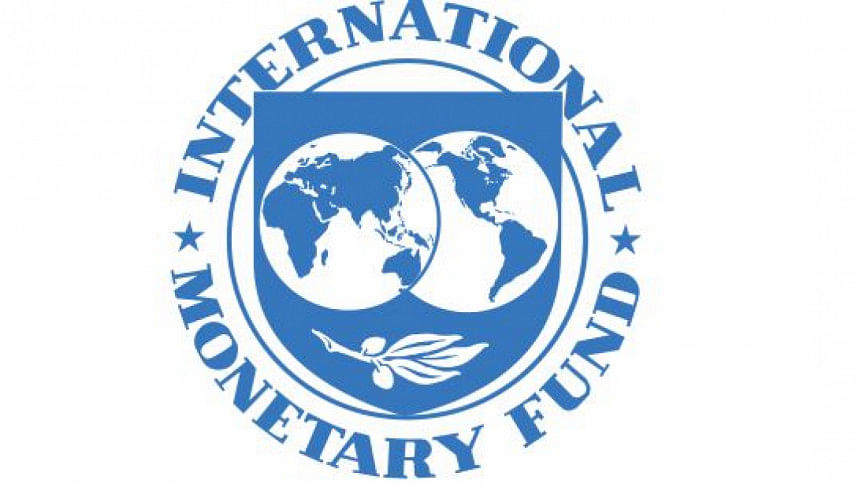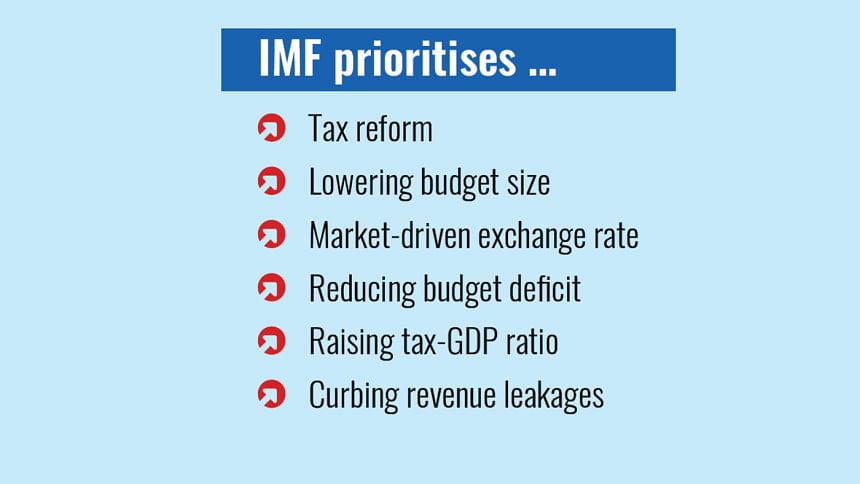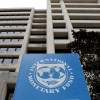Raise tax collection, cut budget size

The visiting mission of the International Monetary Fund (IMF) is prioritising four conditions for releasing two instalments of an ongoing $4.7 billion loan programme, according to Finance Adviser Salehuddin Ahmed.
The conditions comprise raising overall tax collection, reducing the national budget for the next fiscal year of 2025-26, shifting to a more market-based exchange rate regime, and reducing budget deficits.

Ahmed informed journalists about these focus areas after meeting with the IMF delegation at his office in Dhaka yesterday.
Led by Mission Chief Chris Papageorgiou, the IMF delegation is reviewing Bangladesh's progress in qualifying for two instalments together, as the fourth tranche was deferred due to the country's failure to complete some prior actions.
As such, officials of the multilateral lender sat with the top brass of the Bangladesh Bank after meeting the finance adviser earlier in the day.
Ahmed said the IMF is focused on increasing the tax-GDP ratio by boosting revenue collection. They also stressed streamlining the country's tax system, particularly with regard to separating policymaking and administration into separate bodies.
"We discussed how the tax-GDP ratio will be raised and from which sector revenue earnings will be increased," he added.
Ahmed also said the IMF's main concerns are how the revenue will be generated, how large the budget will be, and how much of it will be in deficit.
Furthermore, the multilateral lender is focused on fostering discipline in banking and recovering default loans. "But from the government's side, it has already made sure to prepare a new law to this end," he said.
Asked about the main areas of focus, Ahmed said the IMF is stressing increasing the tax-GDP ratio, strengthening the exchange rate regime, and reducing budget expenditure and the budget deficit.
"These are major priorities for the IMF," Ahmed said.
"Subsidy structures were not included in the discussion, but when budget expenditure is reduced, it will automatically affect subsidies," said the finance adviser.
Asked if a single VAT rate will be implemented to increase the tax-GDP ratio, he said they will not hike the charge in one go, but instead do it gradually.
Asked how Bangladesh will get two instalments together, Ahmed said he would discuss the issue again in Washington after the visiting delegation completes its review.
"So, the decision will be taken in May/June on the basis of the current mission's review," the finance adviser said.
Regarding the required prior actions, Ahmed said: "I told them straight that we are trying our very best considering the country's condition. From their [the IMF's] side, they have shown good intentions."
Ahmed further said that he is hopeful the IMF will consider what the interim government has accomplished so far in following certain instructions from the multilateral lender.
"But regardless of whether the IMF decides to provide the loan or not, the prescribed reforms are helpful for the country," he said.
The tax-GDP ratio in Bangladesh currently stands at 7.5 percent, while it is 12–13 percent in Nepal and 18–19 percent in India, Ahmed added.
Regarding the issue of adopting more market-based exchange rate practices, the finance adviser said the matter will be discussed with officials of the Bangladesh Bank.
As for the IMF's observations on the country's economic condition since the interim government came to power, Ahmed said things are stable and moving in the right direction.
In the face of mounting pressure on its foreign reserves, Bangladesh sought the IMF's assistance at the end of 2022. Then in January 2023, the multilateral lender approved a $4.7 billion loan, of which the country has received $2.3 billion in three tranches so far.

 For all latest news, follow The Daily Star's Google News channel.
For all latest news, follow The Daily Star's Google News channel. 







Comments